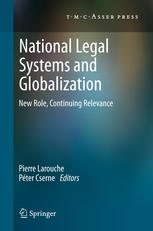

Most ebook files are in PDF format, so you can easily read them using various software such as Foxit Reader or directly on the Google Chrome browser.
Some ebook files are released by publishers in other formats such as .awz, .mobi, .epub, .fb2, etc. You may need to install specific software to read these formats on mobile/PC, such as Calibre.
Please read the tutorial at this link. https://ebooknice.com/page/post?id=faq
We offer FREE conversion to the popular formats you request; however, this may take some time. Therefore, right after payment, please email us, and we will try to provide the service as quickly as possible.
For some exceptional file formats or broken links (if any), please refrain from opening any disputes. Instead, email us first, and we will try to assist within a maximum of 6 hours.
EbookNice Team

Status:
Available4.8
35 reviewsThis book presents the results of research project financed by the Hague Institute for the Internationalization of Law (HiiL) and carried out at the Tilburg Law and Economics Center (TILEC) of Tilburg University. The project team shows that globalization, instead of threatening national legal systems, put them in a new role and gives them continuing relevance. First of all, once one takes a more functional view of the law, based on law and economics and comparative law literature, harmonization or unification of national legal systems is no longer a foregone conclusion. Secondly, fundamental constitutional principles continue to bear in the era of multi-level and transnational governance: they become governance principles, divorced from specific institutional settings. Finally, looking beyond regulatory competition and comparative law, legal emulation provides a rich and fruitful model to explain the interplay between legal systems. This book explores these three themes, both at a theoretical level and in the light of specific examples.